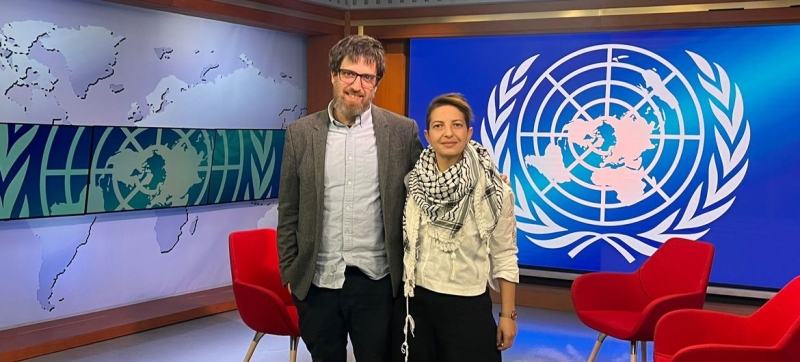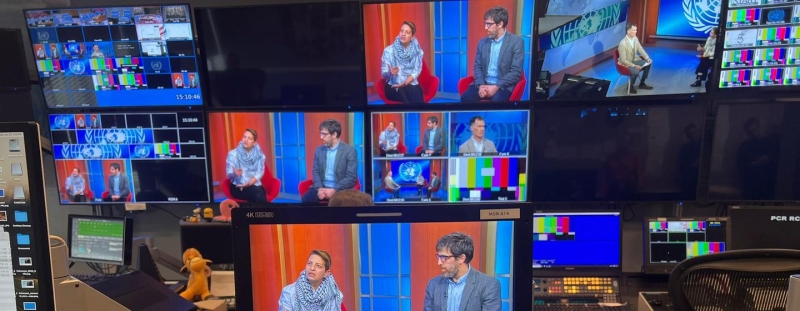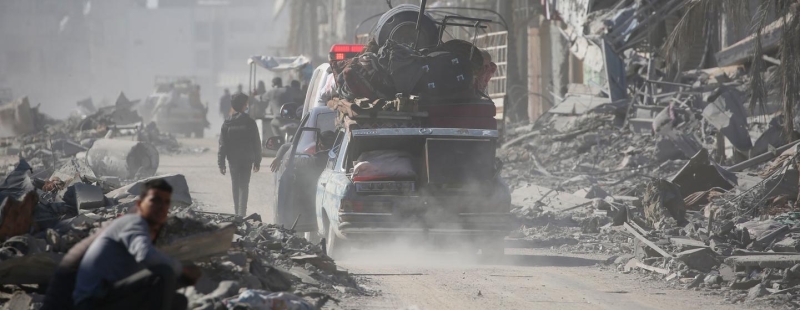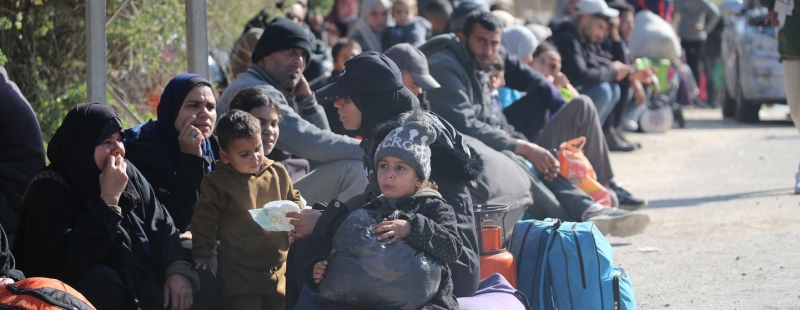
Mai Shahin (right) and Elik Elhanan at UN Headquarters. INTERVIEW | Former Israeli-Palestinian Conflict Participants on Hope for Peace and Nonviolent Resistance Peace and Security
Two men who once represented opposite sides in the decades-long conflict between Palestine and Israel have come to understand, through “sorrow and tears,” the need to live side by side in peace. Given the violence of the recent conflict in Gaza between Hamas and Israel, it has become increasingly difficult to imagine lasting peace in the region. But that remains the goal of the NGO Combatants for Peace.
The twice-nominated Nobel Peace Prize organization brings together Israelis and Palestinians who once resorted to violence but now see peace and dialogue as the only path to healing. In late January, the UN Office of Rule of Law and Security Institutions invited several members of Combatants for Peace, including Mai Shaheen and Elik Elhanan, to UN Headquarters.
May Shaheen is a Palestinian human rights activist and psychologist who has been working on conflict resolution issues for over 12 years. During the Second Intifada, a major Palestinian uprising in the occupied territories that began in 2000, she spoke out against Israel.
Elik Elhanan is a professor at the City College of New York. In the late 1990s, he served in the Israeli special forces. In 1997, his 14-year-old sister was killed in a suicide bombing in Jerusalem.

Mai Sahin and Elik Elhanan in the UN studio.
During their visit to the UN, they shared their stories in an interview with UN News.
This interview has been edited and condensed.
Mai Sahin: Although we may have disagreements, the path to resolving the conflict and ending the occupation is through dialogue. So it is natural for me to sit at the same table with a person who is an Israeli Jew.
Elik Elhanan: The Peace Fighters have been around for a long time. The attacks of October 7, 2023 and the violence and crimes against humanity that followed in Gaza tested our strength. But this is not the first such test.
We have been trying to communicate and dialogue since 2005. The conflict is not going away, but we are learning to live with it. Over the past 20 years, this organization has become my family. These are my brothers and sisters, my colleagues, the people I turn to for advice and support. I trust Mai and the other Palestinian members. We grieve for both communities and we fight for both communities. Our long collaboration has made this natural for me.
UN News Service: How the dialogue has changed since October 7?
Mai Shaheen: From the very first day, we knew we had to meet. It was more necessary than ever. In fact, it became clear immediately after October 7th how important the work we had been doing for many years was. We quickly began discussing how to put into practice everything we had learned and how to demonstrate our commitment to peace for Israelis and Palestinians.
There were many meetings and conversations, much grief and tears.
Dialogue is one of the key strategies we use in Peace Fighters. We don’t just talk about politics, but we deeply interact with each other, giving vent to pain and grief.
We Palestinians supported Israeli activists who went from one funeral to another. They needed someone to vent their frustration, anger, pain and grief to. And we understood that this was the moment when we had to show our communities that nonviolent resistance was the only way for us to live together as equals.
Elik Elhanan: I was in New York City at the time of October 7th, and I was afraid for both communities.
My family lives in kibbutzim in southern Israel. I know people in Gaza. Many of our members have relatives and friends in Gaza, and we knew that the Israeli crackdown would be insane, disproportionate, and criminal. It was horrific.

People return to Rafah in southern Gaza.
But I had one hope left – that the Peace Fighters would survive. As I said, this is not the first crisis, but it is the hardest. And there were moments when we thought the organization would not survive this level of brutality. What saved us was that members of the organization, especially the Palestinians, extended a helping hand. And even in this darkest moment, a glimmer of hope remained.
I lost my sister in 1997 in a suicide bombing carried out by a Hamas bomber. I know this side of the conflict. I also know what it is like to be an aggressor. I could never find a place in Israeli society where I could mourn my sister or forgive myself for my actions.
But my Palestinian friends in the Peace Fighters gave me that space. And losing it was the greatest fear I have ever felt. And the joy that this space still exists gives me hope every day.
UN News Service: How did you come to the conclusion that violence is not an option?
Elik Elhanan: It was not a single moment. It was a long journey, full of internal contradictions.
After my sister’s murder, when I was overcome with rage and pain, the officers of my unit came to me. They had no vision except more deaths, more killings. They said, “Let this go quickly and return to the unit. You will feel normal again. We are going to Lebanon, you will take revenge.”
But the Palestinians who killed my sister were from Nablus. How then can fighting Hezbollah in Lebanon help me cope with the pain or avenge my sister’s death? What is the point of living in a world completely taken over by senseless violence?
The vicious cycle of violence plunged me into depression. I remained depressed for years until I met Palestinian students in Paris during the Second Intifada. We started working together, protesting the violence, insisting that dialogue and peace negotiations based on equality and justice were still possible. And then something changed in me.
Mai Shahin: 13 years ago, I was lucky enough to meet Palestinians and Israelis who shared a vision and a dream of living together. It was my first experience with ordinary Israelis who were not military, who did not interrogate me or intimidate me at checkpoints.

Families in Nuseirat, central Gaza, wait to return to their communities.
I began to rethink my own history and realized that even when I chose the path of armed resistance, my goal was not to kill. We never had anything against the Jewish people or the Jewish nation. We are against occupation. We are against oppression. We are against the separation wall and the checkpoints. Our Israeli partners say the same thing.
UN News Service: Do politicians in Israel and Palestine listen to what you say??
Mai Shahin: In August, we held a major solidarity campaign, which was joined by some members of Knesset. We hope that more people will emerge in politics who are capable of bringing about change.
Elik Elchanan: I must point out that the politicians who support us in the Israeli system are from the far left of the political spectrum. They are members of the Communist Party and the coalition around it, among whom are both Jews and Palestinians. In Israeli politics in general, we have a lot of hidden support, but only a few dare to express it openly.
I think this is because many politicians believe that what Israelis need most now is cohesion, strength and unity. But I am convinced that what we need is a principled opposition. We see how society in Israel and Palestine responds to our work, and we hope that politicians both in Israel and abroad will follow suit.
UN News Service: The idea of resolving the conflict through the creation of two states – Israeli and Palestinian, peacefully existing side by side – has been the official position of the UN for decades. How possible is this still?
Mai Shahin: The real solution is for all people to live in freedom on one land, like in America or Europe, where Christians, Jews, Muslims, Buddhists and atheists live together freely and respect each other.
Elik Elhanan: Reality changes and attitudes change too. At Peace Fighters, we began to develop a common political language that allows Israelis and Palestinians to exist together in a single political system. This experience changed me. I enjoy sharing my political space with the Palestinians, taking into account their experiences, their reasoning, their unique understanding of history and politics.
We do not make any official statements on this issue – that is a job for others, perhaps for the people in this building. We are here to say: the solution must be found through negotiations and a peace process, not through violence, war, ethnic cleansing and genocide.
Anything is better than what is happening now.
